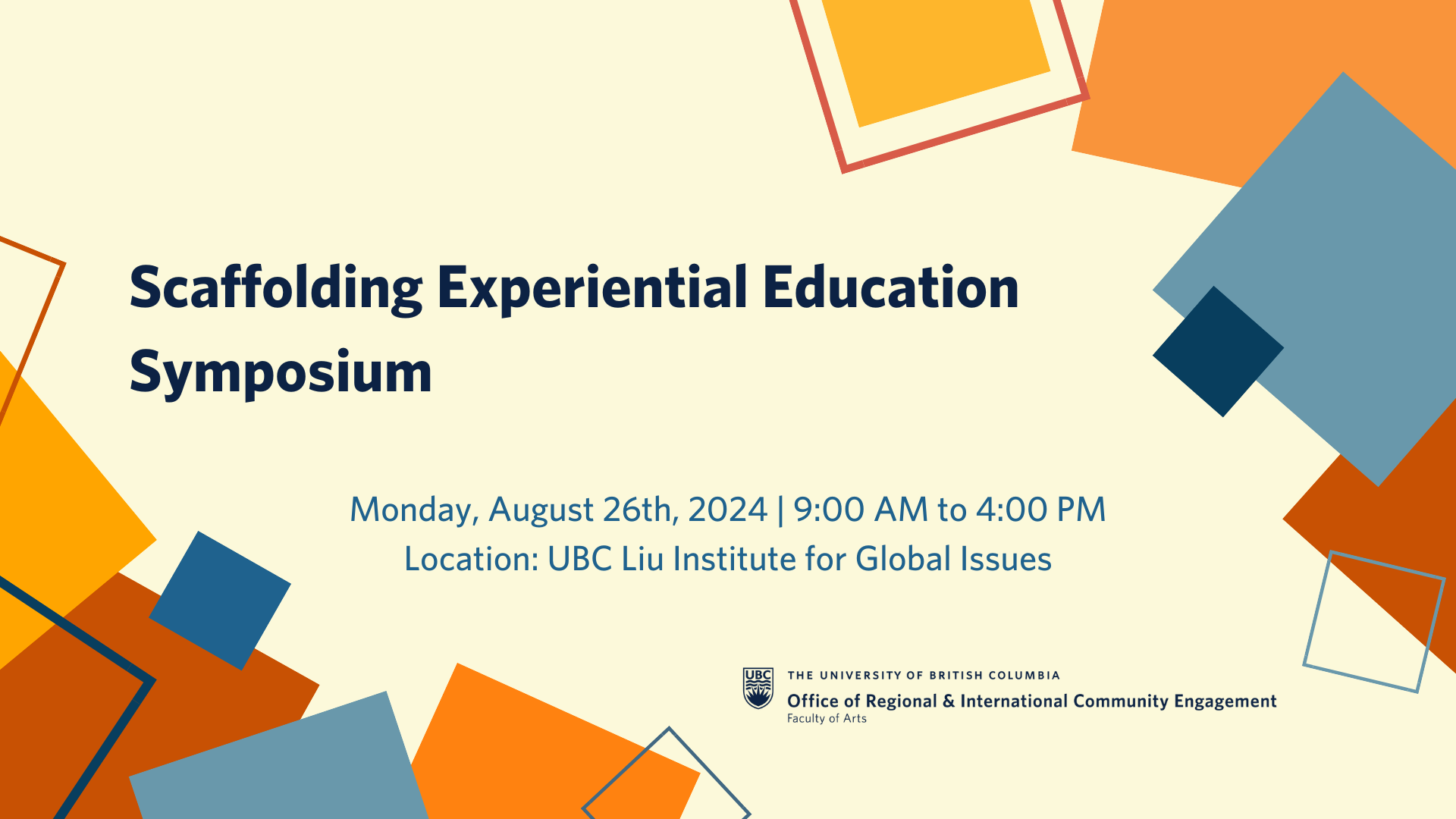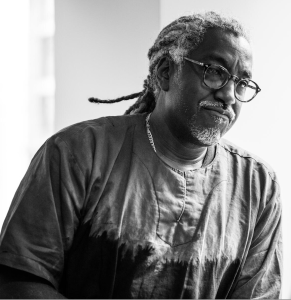
EVENT DETAILS
eventDate: Monday, August 26th, 2024
Time: 9:00 AM - 4:00 PM
location_onLiu Institute for Global Issues
6476 NW Marine Dr, Vancouver, BC, V6T 1Z2, Canada
EVENT DETAILS
Date: Monday, August 26th, 2024
Time: 9:00 AM - 4:00 PM
Liu Institute for Global Issues
6476 NW Marine Dr, Vancouver, BC, V6T 1Z2, Canada
About
We hosted a symposium on Monday, August 26th, 2024 on “Scaffolding Experiential Education”. This symposium served as a platform for sharing experiential education approaches, discussing challenges, and celebrating successes. Specifically, this event built upon a study we have been doing on experiential education in large junior-level courses. It also addressed the facilitators, barriers, and the potential of scaffolded learning outcomes in teaching experiential education in large courses. We had the opportunity to engage with your thoughts and experiences on these topics throughout the scheduled sessions.
The symposium consisted of one keynote presentation and several workshops. The sessions covered topics such as expanding the idea of experiential education, diversity, equity, and inclusion in the classroom, methods of assessment in experiential education, and the use of technology within experiential education.
Many faculty members, instructors, and graduate students who were interested in learning more or are already implementing experiential education in their teaching, attended this symposium. The symposium provided an opportunity for sharing, learning, and engaging with topics related to experiential education in large classrooms and across the undergraduate degree.
Special Issue Note
All speakers and workshop facilitators were invited to contribute to a special symposium issue for an academic journal, to be edited by the symposium organizers. We also invited all attendees to use this symposium as a platform to connect and collaborate with others, or to advance their thinking and work on experiential education.
Agenda:
- A Keynote Presentation by Dr. Timothy K. Eatman
- Concurrent Workshops: Symposium attendees had the opportunity to attend two of four concurrent workshop sessions. In these workshops, participants discussed several topics related to experiential education, including defining and doing EE in large classrooms, assessing students’ EE work, issues of equity, diversity and inclusion for EE in large classes, and technology mediated EE in large classes.
- A Full Group Session: In this focus-group session, all presenters and participants discussed the barriers and facilitators to experiential education in large classrooms.
Schedule
“Scaffolding Experiential Education” took place on Monday, August 26th, 2024, at the UBC Liu Institute for Global Issues.
| Time | Session |
|---|---|
| 9:00 AM | Coffee & Registration |
| 9:20 AM | Opening Remarks |
| 9:35 AM | Keynote Presentation |
| 10:45 AM | Coffee Break |
| 11:00 AM | Session A: Defining & Expanding our Understanding of Experiential Education Session B: Assessing Students’ Experiential Education (in Large Classes) (Panel) |
| 12:00 PM | Lunch Break |
| 1:00 PM | Large Facilitated Session: A Discussion about our Experiences as Instructors Engaging in EE. |
| 2:00 PM | Coffee Break |
| 2:15 PM | Session C: Exploring Issues of EDI for Experiential Education in Large Classes Session D: Immersive Technologies within Experiential Education Classrooms (Panel) |
| 3:30 PM | Special Issue Meeting |
Session Descriptions
Session Time: 11:00 am - 12:00 pm
Dr. Kari Grain
Experiential education pedagogies are expansive, and yet, as scholars and practitioners we may have a limited view of what experiential education is. In the preliminary findings from a study looking at experiential education in first year large classes at UBC-V, instructors held specific (mis) conceptions of what experiential education is and often associated it with highly immersive pedagogies that can be challenging to implement in larger classrooms with first- and second-year students. However, instructors also spoke of using strategy specific, or “bite size” experiential education activities that engaged students into learning more about their disciplines and developing skills that will benefit additional forms of experiential education in the future (p. 26-27).
Dr. Kari Grain, one of the authors of the 2020 report “Experiential Education at UBC-Vancouver: Summary of Research and Recommendations” and current instructor of EDST 520 – an Experiential Pedagogies course shared the breadth and possibilities of this approach.
Session Time: 11:00 am - 12:00 pm
Dr. Jonathan Graves, Dr. Evan Mauro, & Dr. Awneet Sivia
Moderator: Dr. Pheroze Unwalla
Experiential education classroom work can be engaging, innovative, and diverse, making it a powerful teaching and learning vehicle that is challenging to assess at times. One of the significant barriers for instructors implementing experiential learning pedagogies is assessment, especially in larger classes. In this session we will hear from a panel of faculty members who engage with experiential education pedagogies about their experiences, including some insights into what is working, current challenges, and new directions in assessing students' experiential education work.
Dr. Pheroze Unwalla (moderator), Dr. Awneet Sivia, Dr. Jonathan Graves and Dr. Evan Mauro (panelists) shared their reflections, scholarship, and thoughts on what to assess, when, how, and why.
Session Time: 1:00 pm - 2:00 pm
Dr. Siobhán McPhee, Dr. Katherine Lyon, Tamara Baldwin, & Lorenia Salgado-Leos
The allocated time started with a brief 10-minute overview of research findings on why and how instructors incorporate EE, despite challenges. Small group discussions followed, where participants brainstormed key EE skills for first- and second-year students to prepare them for upper-year experiences and explore strategies to overcome common barriers to EE at various institutional levels. By the end of the session, participants gained practical insights into enhancing EE in lower-level courses and identifying next steps for advancing these practices. This Presentation and the resulting Engagement Profiles summarize the key takeaways from this session.
Session Time: 2:15 pm - 3:30 pm
Dr. Will Valley, Dr. Moberly Luger, & Dr. Laila Ferreira
Moderator: Dr. Arig al Shaibah
Institutional and equity barriers were discussed for both instructors and students in a study looking at experiential education in first year large classes at UBC. The preliminary findings showed that for students, “barriers can include accessibility issues, time constraints and responsibilities outside of school, economic constraints, language, and cultural barriers as obstacles that students face that may dissuade them from taking part in experiential education opportunities” (pg. 41). For instructors, the study found that “the labour-intensive nature of experiential education and the fact that the marginalized scholars who often implement experiential education, may not be in tenure track positions, (presents) a very apparent inequity in the division of the burden of the implementation of EE. Individuals who are in lecturer roles, or are alternatively precariously employed, have a higher teaching load to ensure their own financial stability” (pg.41).
Dr. Arig al Shaibah (moderator), Dr. Moberly Luger, Dr. Will Valley and Dr. Laila Ferreria (panelists) shared their reflections on equity, diversity, and inclusion as it relates to experiential education in their classes and/or with their colleagues.
Session Time: 2:15 pm - 3:30 pm
Dr. Nina Hewitt, Dr. Fatemeh Salehian Kia, & Professor Christine D’Onofrio
Moderator: Dr. Richard Arias-Hernandez
The inclusion of technologies in experiential education presents significant opportunities to engage students in experiential learning in ways that may not be possible (or are less accessible) in a typical classroom environment. Technology innovations can also be intimidating to consider when unfamiliar.
Through this panel, we heard from our colleagues who are using technology in many ways with experiential pedagogies. Dr. Richard Arias-Hernández (moderator), Christine D’Onofrio, Dr. Fatemeh Salehian Kia and Dr. Nina Hewitt discussed their approaches, experiences and practices to experiential pedagogies.
About the Keynote Speaker

Dr. Timothy K. Eatman
Timothy K. Eatman, Ph.D., an educational sociologist and publicly engaged scholar, serves as the Inaugural Dean of the Honors Living – Learning Community and Professor of Urban Education at Rutgers University-Newark. Prior to this current appointment his primary network of scholarly operation and leadership was with the national consortium Imagining America: Artists and Scholars in Public Life then headquartered at Syracuse University serving as Faculty Co-Director and as Associate Professor of Higher Education. Tim currently serves as Chair of the Board of Directors and Membership Committee Chair of the American Association of Colleges and Universities (AAC&U). Also, with AAC&U, Tim has served as a faculty member of the Institute on High Impact Practices for Student Success (HIPS) since its inception. Hs is national co-chair of the Urban Research Based Action Network (URBAN) a member of the National Advisory Committee for the Carnegie Engagement Classification for Community Engagement, member of the National Advisory board for Bringing Theory to Practice (BTtP) and its Paradigm Working Group. Tim was elected Member at large of the American Democracy Project Steering Committee of The American Association of State Colleges and Universities (AASCU). Tim has served as board chair of the International Association for Service Learning and Community Engagement (IARSLCE).
Pursuing a rigorous scholarly agenda, Tim publishes widely, serves on editorial boards and reviews for Academic publishing houses, scholarly journals and conferences. He has written several book chapters and research reports including the widely cited Scholarship in Public: Knowledge Creation and Tenure Policy in the Engaged University, a seminal report on faculty rewards and publicly engaged scholarship. Tim is co-editor of The Cambridge Handbook of Service Learning and Community Engagement. He recently accepted an appointment as Guest Editor for the eJournal of Public Affairs.
A widely sought-after speaker, workshop facilitator, and collaborator who has earned local, national and international recognition for his leadership in advancing understandings about the multi-faceted impact of publicly engaged scholarship in the university of the 21st century, Tim was recognized by the University of Illinois College of Education with its 2018 Distinguished Alumni Award.
See here for the UBC School of Public Policy & Global Affairs’ feature on Dr. Eatman’s Keynote.
For more information about Dr. Eatman, see his webpage at http://timeatman.com.